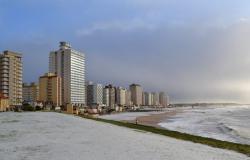«He grabbed me by the shoulders and did a sweeping technique with Jenny’s feet and mine, and gave me a hard push. When I fell, I hit my head very hard. For a moment she clouded over me … the sight and I felt like a taste of blood in my throat. I didn’t lose consciousness, but I was very disoriented. “They grabbed me by my forearms and my legs, they dragged me to the door of the patrol car.” This is how the Cuban professor, essayist and historian describes her arrest on June 18. Alina Bárbara López, 58 years old. Together with her colleague Jenny Pantoja, Torres were arrested by State Security agents at the exit of the province of Matanzas, when they were heading to Havana for a peaceful demonstration.
The officers even grabbed her by the hair to put her in the patrol car; she did not resist, but was still “stunned” by the blow to the head. On the way to the police station, the officer even put her handcuffs on him so tight that she cut off his circulation. “That’s so you can learn,” she told him. Her crime was asking the officer the reason for her arrest and if she had a court order to do so. Both would be released hours later.
This has not been the first time that this intellectual has been accused of a falsely constructed common crime. Still in pain, Alina B. López explains it to ABC: «In Cuba, the political system is monolithic, exclusive and, therefore, does not admit competition. Therefore, it denies the possibility of dissent and hides the existence of people who are against certain decisions against the system or against government policies. They are considered enemies and the idea is also to deny the existence of political prisoners, against whom they always fabricate common crimes.
In my case, the two crimes that have been charged to me, one for which I was convicted (disobedience) and the latter for which I have just been instructed (attack), the purpose is not to recognize that Cuba is not a state of law, but a country where its citizens do not have the right to participate in politics and are persecuted for it. I once asked an ambassador if they had tried to approach the Cuban Government to consider a pardon or amnesty for political prisoners, and she answered yes, but they tell them that these people are imprisoned for common crimes and not for a political crime. .
“Breaking a tradition”
The result of this strategy of the Cuban regime is to make the political prisoner ‘disappear’ by locking him up with common prisoners (thieves, murderers, rapists…). “This breaks with a tradition that existed regarding the differentiated treatment of political prisoners in Cuba, including during periods of dictatorships such as those of Machado and Batista,” explains the professor. And that has been made clear even with testimonies from those times. If you were arrested and had not yet been prosecuted, you could be murdered, tortured, raped… but once you were prosecuted, convicted and entered prison, the treatment was absolutely respectful. And that is not what exists in Cuba today.
The demonstration to which Alina Bárbara López and Jenny Pantoja were addressing is the so-called ‘Protest of the 13’, which began in 2023 on a monthly basis and in which they demand, among other things, the convocation of a National Constituent Assembly to prepare a Constitution for all, the freedom of political prisoners or respect for freedom of expression. However, before she joined the protest in 2023, in October 2022 she began to be persecuted by State Security. “When you are a person who knows history and you can dismantle the messages and manipulation that power has done on history as a way of molding attitudes and behaviors, that is something that is very annoying,” explains Alina Bárbara López.
In addition to his research, books and essays, he began writing articles for a wide audience in ‘La Joven Cuba (LJC), an Internet media outlet. “That was what started to bother me, I would say much more than the demonstrations,” she says. And he adds: «I am a left-wing person. For me, the ideal model must be a democratic socialism, with pluralism, with respect, even with entrepreneurship, with private companies as well, but with a strong public company, which is truly controlled by citizens, with elections, with diverse political parties. .
His horizon, right now, is to achieve change in Cuba and for that, he assures, “I have to respect other political opinions. Right now, the case of Cuba is not about being socialist or capitalist. The case of Cuba is that it has to be respectful of the rights of citizens and give them the opportunity to choose what future they want. And, of course, the change is not going to come from power. Power must be convinced that it has to change through pressure from below, which for me must be through peaceful, non-violent means; Without social pressure, no system moves. And I think we are close to achieving it.”





